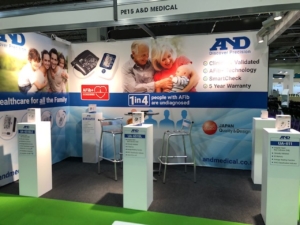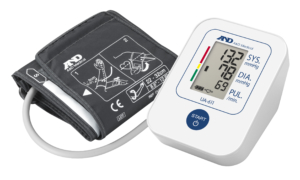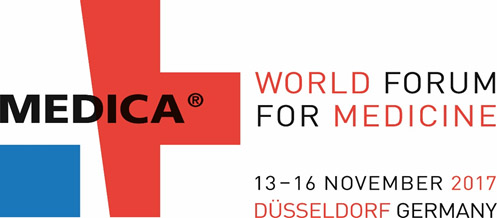What is Atrial Fibrillation?
Atrial fibrillation (AF) is a type of irregular heartbeat. It occurs when your heart is not pumping as well as it should, resulting from a disturbance in the electrical conduction pathways in the heart. A condition more common with advancing age, if left untreated can lead to serious complications such as heart failure and stroke.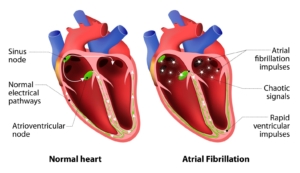
Being the most common sustained heart rhythm disturbance (arrhythmia)1 and affecting 1 in 4 middle-aged adults at some point in their life2, people with AF are three to five times more likely to suffer a devastating, debilitating, disabling and often fatal stroke than people without AF.
Resulting from a disturbance in the electrical conduction pathways in the heart leading to an irregular pulse which can often be quite rapid, AF often contributes to symptoms of palpitations, shortness of breath, chest discomfort, light headedness, fainting and fatigue.
The Scale of the Problem
 AF-related strokes cause unacceptably high levels of death and disability, and the scale of the problem across Europe is increasing as our populations age.
AF-related strokes cause unacceptably high levels of death and disability, and the scale of the problem across Europe is increasing as our populations age.
By 2035 the number of strokes is projected to rise by 34%, to over 800,000 events.3 At the same time, the number of people with AF is increasing and, by 2060, it is estimated that nearly 18 million adults over the age of 55 will have AF.4
Screening for Atrial Fibrillation

No country has yet established a national screening programme (NSP) for AF, including the UK. However, there is an increasing body of evidence suggesting screening may be beneficial, prompting recommendations from prominent expert bodies to screen for AF.5 The British Cardiovascular Society issued a statement suggesting that it would be in the public interest to initial such a screening programme.6
Several factors have led to an increased interest in AF screening.8
The prevalence of AF is increasing due to a combination of population ageing, changing patterns of risk factors, and improved survival rates in other, contributory forms of cardiovascular disease.
Newer treatments are available in the form of novel oral anticoagulants (NOACS), which are safer, at least as effective as the existing treatment mainstay of vitamin K antagonists, and simpler to use (as they do not require regular blood tests).
A number of relatively inexpensive screening devices for detecting AF in the community have been developed and the field may evolve rapidly as new technologies and algorithms emerge.
Ambulatory Blood Pressure Monitors
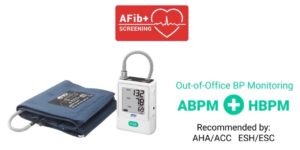 Ambulatory Blood Pressure Monitors (ABPMs) provide testing to determine the presence of hypertension by taking measurements during normal daily activities, over a span of 24 (or more) hours. They help to diagnose as well as monitor high blood pressure (hypertension), usually defined as a systolic pressure of 140 mm Hg or more and a diastolic pressure of 90 mm Hg or more.
Ambulatory Blood Pressure Monitors (ABPMs) provide testing to determine the presence of hypertension by taking measurements during normal daily activities, over a span of 24 (or more) hours. They help to diagnose as well as monitor high blood pressure (hypertension), usually defined as a systolic pressure of 140 mm Hg or more and a diastolic pressure of 90 mm Hg or more.
ABPMs are portable blood pressure devices worn on a belt, with the cuff being attached around the upper arm. All types of daily activities, including sleep, may be normally carried out while wearing this device.
Benefits of ABPM
By giving an accurate picture of a patient’s blood pressure throughout the day and during sleep, it can prevent unnecessary prescribing of hypertension-reducing drugs for white coat hypertension. It also helps patients with masked hypertension to receive required treatment. It reduces the risk of stroke, heart disease, and organ damage caused by hypertension, and also shows how well a person responds to a long-acting antihypertensive drug.
Footnotes
- Camm AJ, Kirchhof P, Lip GY, et al. 2010. Guidelines for the management of atrial fibrillation: the Task Force for the Management of Atrial Fibrillation of the European Society of Cardiology (ESC). Eur Heart J 31(19): 2369-429
- Kirchhof P, Benussi S, Kotecha D, et al. 2016. 2016 ESC Guidelines for the management of atrial fibrillation developed in collaboration with EACTS. Europace 18(11): 1609-78
- Stroke Alliance for Europe. 2017. The burden of stroke in Europe. London: Stroke Alliance for Europe
- Krijthe BP, Kunst A, Benjamin EJ, et al. 2013. Projections on the number of individuals with atrial fibrillation in the European Union, from 2000 to 2060. Eur Heart J 34(35): 2746-51
- Kirchhof P, Benussi S,Kotecha D,et al. (2016) 2016 ESC guidelines for the management of atrial fibrillation developed in collaboration with EACTS. Eur Heart J 37(38):2893–2962
- British Cardiovascular Society (2014) BCS statement on screening for atrial fibrillation to prevent stroke (BCS), http://www.bcs.com/pages/news_full.asp?NewsID=19792297 (accessed 22 May 2017).




 Attracting more than 5,100 exhibitors from 70 countries in 17 halls and tens of thousands of national and international experts and decision-makers from the sector, Medica 2018 presents an extensive exhibition and an ambitious program — which together present the entire spectrum of innovations for outpatient and clinical care.
Attracting more than 5,100 exhibitors from 70 countries in 17 halls and tens of thousands of national and international experts and decision-makers from the sector, Medica 2018 presents an extensive exhibition and an ambitious program — which together present the entire spectrum of innovations for outpatient and clinical care.